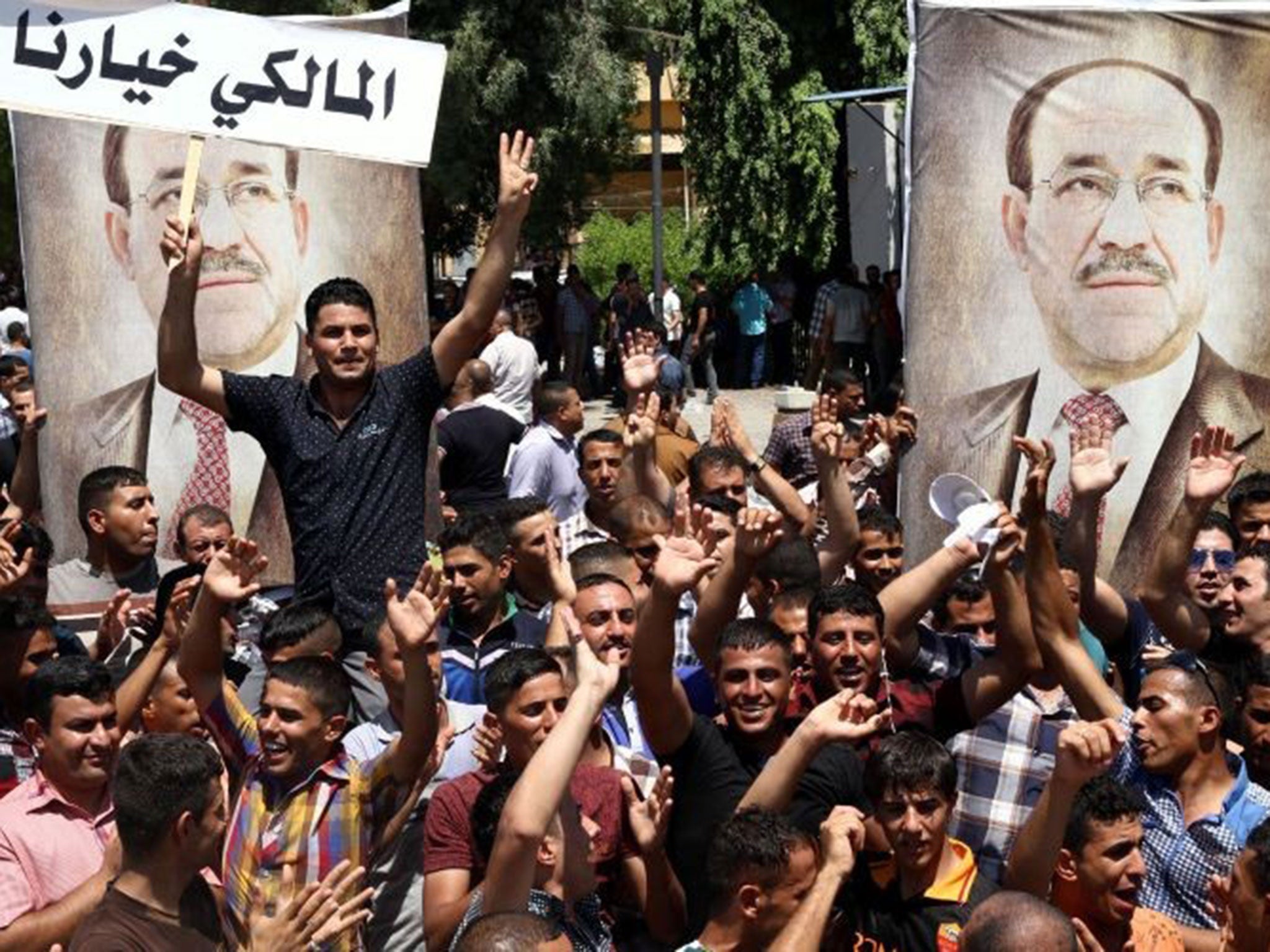Iraq crisis: New Prime Minister named, but Nouri al-Maliki refuses to stand down without a fight
Possibility of civil conflict within Baghdad looms as Maliki deploys elite forces and his supporters take to the streets

Iraq’s new President appointed Haider al-Abadi as the Prime Minister today, damaging the hopes of Nouri al Maliki of serving a third term in the position and raising the possibility of civil conflict in Baghdad, even as militants threaten the capital.
Mr Maliki is reluctant to give up his ambition despite military defeat and the Shia coalition turning against him.
“I think Maliki is finished politically, but he still has military units and officials who are loyal to him personally,” said an Iraqi commentator. He cautioned that Mr Maliki should not be written off too soon. The inability of Iraq to find a new leader in the two months since Isis, which styles itself Islamic State, captured Mosul has prevented an effective response to its victories. The US has congratulated the new Prime Minister.
In brief remarks delivered from his holiday residence in Martha's Vineyard, President Barack Obama said he and Vice President Joe Biden had spoken with Mr al-Ibadi.
In a television address President Fouad Massoum gave Haider al-Abadi, a moderate Shia politician and former finance minister, 30 days to form a new government. Mr Abadi pledged to “protect the Iraqi people”, but it is a measure of the divisions within the Shia bloc, which has ruled Iraq since 2005, that supporters of Mr Abadi expressed fears for his safety. Earlier Mr Maliki had deployed elite military units in the capital while hundreds of his supporters took to the streets shouting “we are with you al-Maliki”.
Widely blamed for provoking a Sunni uprising led by Isis and for presiding over a chronically corrupt and authoritarian government, Mr Maliki may genuinely believe he can remain as Iraqi leader. Alternatively, his refusal to leave office may be motivated by a determination to exact the highest possible price for his departure, including immunity from corruption charges and a large security detail to guarantee his personal security.
Mr Maliki still retains popular support among Iraq’s Shia majority because he has presented himself as the victim of a Sunni counter-revolution and a Kurdish stab in the back. His critics hold that he created a sectarian state that persecuted the country’s six million Sunni and provoked them into a rebellion led by Isis.
Mr Maliki’s bloc won the most parliamentary seats in the 30 April elections and the Prime Minister sees himself as rightfully keeping the post. In a speech, Mr Maliki said he was filing a suit against the President for neglecting to name him prime minister by Sunday’s deadline and all but demanded he be re-nominated.
Critics say Mr Maliki contributed to the crisis by monopolising power and pursuing a Shia agenda that alienated the country’s Sunni six-million strong Sunni. His rejection of the nomination of Mr Abadi as the new Prime Minister is based on a technicality whereby the largest party, Mr Maliki’s State of Law, has the right to form a new government rather than the Shia coalition, the National Alliance, which has turned against him. Mohammed al-Ogeili, a politician from Mr Maliki’s list, rejected the nomination of Mr Abadi, saying that this move “runs against the constitution”.
Western allies of Iraq have been demanding the departure of Mr Maliki and the creation of a more inclusive government. But it is by no means certain that a more conciliatory government will be able to cut a deal with the Sunni community who have seized power in their own provinces. Sunni politicians in Baghdad who are bidding for jobs no longer dare return to their own cities which are ruled by Isis. Isis has never expressed interest in negotiations with the Iraqi or any other government and is pledged to extend its caliphate across the world. Its forces continue to advance near Baghdad taking the town of Jalawla in Diyala province where they have been fighting for weeks with Kurdish Pesh merga troops.
The military crisis in Iraq following the capture of Mosul on 10 June has been matched by a less well publicised political crisis in Baghdad. Mr Maliki had done well in the April election by presenting himself as the Shia leader best able to defeat a Sunni counter-revolution. He was likely to be chosen as prime minister for a third term until his 350,000 strong army disintegrated in the face of an offensive led by some 6,000 Isis fighters. Even so he refused to step down or admit responsibility for failure.
Mr Maliki’s State of Law party has now split, effectively ensuring that he cannot remain Prime Minister unless he uses military special forces loyal to him. Reidar Visser, a Norwegian expert on Iraqi politics, wrote in a blog yesterday that pressure had been building within the State of Law for Mr Maliki to go: “Finally today, factions led by Haider al-Abadi of the Daawa and Hussain al-Shahristani, the current deputy PM, broke with Maliki to nominate Abadi for PM. Early reports suggests 38 Daawa MPs and 12 members of the Shahristani bloc abandoned Mr Maliki, leaving him with the backing of only around 45 members of the original 95-member State of Law bloc.” Mr Maliki’s attempts to block MrAbadi by legal means are likely to fail.
Join our commenting forum
Join thought-provoking conversations, follow other Independent readers and see their replies
Comments
Bookmark popover
Removed from bookmarks